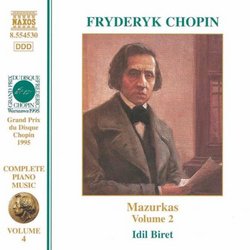Idel Biret Plays Chopin Mazurkas -- 2
Robin Friedman | Washington, D.C. United States | 03/04/2008
(5 out of 5 stars)
"Idel Biret's complete set of Chopin on Naxos has been so widely and justly acclaimed that I am surprised there are relatively few reviews of her performances on Amazon. This CD is the second of a set of two of the Chopin Mazurkas. The CD includes 25 works, beginning with three mazurkas of opus 41, composed in 1838-1840 and concluding with Chopin's final efforts in this form, opus 68 no. 4 and opus 67 no 1, written just before his death, together with some of his early works.
The mazurka is a Polish dance in 3/4 time. Chopin turned a simple dance form into works of great variety and deep introspection. The mazurkas are generally short, and in many of them the music, the performer, and the instrument effectively fuse together as one. The mazurkas cover a wide emotional compass from the meditative to the resolute. They are full of harmonic daring and sudden changes in key and mood. Chopin also makes great use of counterpoint -- generally in creating an echo effect -- in the mazurkas. Here as elsewhere he was much more influenced by J.S. Bach than is often realized.
Biret offers a beautiful performance of virtually all these works with subtle rubato and clear voicing of the melodic lines. Her playing is simple and restrained as she avoids calling attention to herself or her technique. Her recordings of the mazurkas offer an excellent opportunity for the listener or pianist who wants to get to know these works to listen to them in detail. This is music that demands multiple hearings.
In approaching the mazurkas on this CD to highlight in this review, I turned to the valuable guidebook, "Music for the Piano" by James Friskin and Irvin Freundlich, a still-useful guide to the literature for the instrument available from Dover Press. They identify the following mazurkas included on this CD as having "outstanding features" (the comments that follow are a combination of the authors's comments and my own): Mazurka in C-sharp minor opus 50 no 3 (a melancholy work that makes large use of counterpoint with a contrasting middle theme); Mazurka in B major, opus 56 no. 1 (a quiet lyrical work with many subtle harmonic touches and changes of key); Mazurka in A minor, Opus 59 No. 1 (a haunting work with much counterpoint and a chorale-like middle section); Mazurka in A-flat major, opus 59 no. 2 (upbeat, lively melody with a great deal of chromaticism); Mazurka in F-sharp minor, opus, 59 no 3 (highly distinctive rhythms, a frilly theme, and much use of counterpoint); Mazurka in F minor, opus 68, no. 4 (Chopin's last composition, sad and melancholy, full of harmonic changes).
Listeners new to the mazurkas might begin by hearing the works identified above. I also make the following suggestions of my own: Mazurka in F major, opus 68 no. 3, (an early work that Chopin published late with a simple march-like theme and a quick middle section in the high register of the instruments -- long a favorite of mine); Mazurka in G minor opus 67 no. 2 and Mazurka in A minor opus 67 no 4 (two late works, readily recognizable that will be familiar to many listeners); Mazurka in C sharp minor, opus 63 no 3 (a waltz-like work full of ornaments and trills.) With repeated hearings, every listener will form his or her own favorites.
This CD and its companion volume (which includes the earlier mazurkas) are ideal ways to get to know and love these short jewel-like pieces for the piano.
Robin Friedman"


 Track Listings (25) - Disc #1
Track Listings (25) - Disc #1